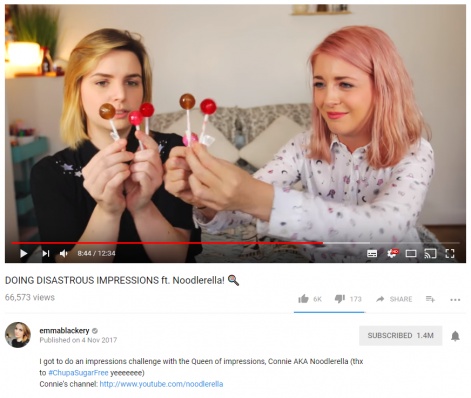The FTC has updated its guidelines this month, following a crackdown which saw a few influencers come under fire over a lack of sponsorship disclosure.
A 2014 case involving YouTube star PewDiePie and Shadow of Mordor publisher Warner Bros came back into the spotlight recently; concerns were voiced by TINA.org that neither party had not taken action to appropriately disclose sponsorship since the case was settled.
We asked our Viral Visionaries: How do you think the changes to FTC guidelines will affect or change Influencer Marketing, for better or worse?
I believe influencers have to disclose and be both responsible and accountable on their content. For good or for bad, consumers need to know what they watch and how this content is reaching them. We keep seeing a lot of disparity in influencer content VS more traditional media accountability (especially when touching sensitive topics). I personally advocate all my clients to have a good marketing mix but the audience needs to be protected, regardless from which channel they plan to use. I personally welcome more scrutiny as they will contribute to help the consumer to understand what they are watching and how those contents are created.
I hope that this would change influencer marketing for the better, as I believe there should definitely be guidelines and standards in place for sponsored content. It’s a disservice to the audience to not disclose, and if you lose your trust with the audience, it is really difficult to get that back. As an influencer or a developer/publisher, your brand is an incrediby valuable asset, and you don’t want to jeopardize it by not being transparent.
It’s only for the better - from all sides, brand, creator and consumer - in my view. It’s 2017 and 'fake news' is the word of the year. Consumers are rightly hyper-aware of what’s real or not on social media and crave transparency.
Greater transparency leads to increased consumer understanding/awareness of what sponsored content is (something that Stefano mentioned), which I believe will positively impact future performance of influencer campaigns undertaken by brands. Trust enhances receptivity - the more commonly accepted/established a notion it is that brands partner with content creators for sponsored content, the better off everyone will be. After all, the best influencer campaigns are - in my opinion - always those where the brand, creator and consumer are working as one to create memorable content.
I agree the FTC is doing this for the better, it can be a bit overbearing at times but in the end it ensures that YouTubers truly love a product enough to say "hey I’m sponsored by this", and also allows the fan to see that this is paid for and not feel tricked or cheated. On the flip side, some Talent feel it leads to fans feeling like they are sell outs, but its the talents job to make their fans realize they wouldn’t take the payment if they didn’t truly love the product! As a manager I assist in helping the talent do this via wording of the disclosure, along with doing other things like tweeting before doing a video etc!
I agree with Brian that it’s only a good thing if influencers will have to think more carefully in the future if they really like the product they are promoting and if they can stand behind it. I think this will lead to better campaign performance: If the influencer is promoting something just for money and doesn’t really care for the product, I think the fans can sense it. That cannot be good for the campaign. The trust of their fans should be the first and foremost thing they think about, and these guidelines will help them keep that trust. Even before I think many influencers have adopted transparency for the sake of keeping their audience’s trust. As others have said before me, having this type of rules or guidelines in place is only good for the brands as well.
Having a clear distinction between paid and organic content is important for viewers and all creators, agencies and advertisers should understand the rules and insist on transparency. Overall the FTC and ASA (in the UK) codes do a good job of protecting the audience.
However, we must be alive to the fact that the online creator space already has a heavier burden of accountability than TV and print and while lurid stories of vulnerable children being excessively marketed to make for good press they are mostly misrepresented.
There is a possibility of over-regulation in the future that could make branded content on distributed platforms very difficult and we should be organising around trade bodies or other organisations in the UK, Europe and the US to create our own self-regulation principles and codes going forward.
From a branding point of view, both advertisers and audiences play a pivotal role during any influencer campaign. Chances are you know what to expect when you partner up with an influencer, what you have little control over is the way the community will respond.
Historically, audiences hate being misled on social media, which these guidelines are helping to combat and can therefore only be seen as a positive step forward in our industry. As many influencers can fall into the trap of not being aware of the need to disclose paid endorsements, at dingit.tv and thegamer.tv we incorporate a human vetting process that filters all content, which in turn helps advertisers to protect their brands online and audiences to access only the most engaging video highlights.
Get the audience on side and you begin to build a strong community which can lead to greater success further down the line. Public perception is worth more than any influencer’s voice so it’s up to content creators, as well as the platforms they reside on, to be open about sponsorship deals, whilst providing engaging and creative content for audiences everywhere.

I think that Influencer Marketing will have a long-term benefit from the recent development. As the others have said, it should be a no-brainer that influencers must openly communicate any sponsored content they are producing. Unfortunately, there are still some shady players out there who are trying to work around this and shed a bad light on the influencer marketing scene in general. Getting rid of these shady players will help to establish Influencer Marketing as what it should be: A constant in the marketing mix of every (gaming) company.
Disclosure of Influencer Marketing shouldn't be seen as harmful to the activity. If the disclosure is implemented correctly, e.g. the influencer explaining to their audience that this kind of content allows him to run his channels the way he does and to produce all these great videos they love, it can even be helpful. It is possible to positively attribute the marketing content, which makes viewers keen on buying the products in order to support their favorite influencers.

Jiri is the founder of Shark Punch, a transatlantic game development company working on a game about bank robberies in the 70s.
He was the CEO and a founder of the cross-platform gaming pioneer Rocket Pack, which was acquired by Disney in 2011.
He has been part of the Finnish games industry for almost 14 years, but currently resides in San Francisco because the weather in Helsinki sucks.
Agree with everyone else that it's a positive development, and will likely increase the relevance and quality of sponsored content. And on that note, what we're seeing is that clearly tagged sponsored content can easily perform as well as regular content for the influencers, as long as it's in line what fans except from the influencer. Several videos done through Matchmade have even massively outperformed other content on those channels, despite being marked as sponsored.
On the other hand, it does feel like the requirements for influencers can often be more strict than for traditional media - but I'm sure this will even out in the long term.
Rich has raised very interesting points and it would be great to see an undertaking by the industry trade bodies to lead on this, just as they've done in the past with age ratings.
Channels and game publishers are often surprised when they learn the FTC considers giving a game for free for review should be subject to disclosure, and compliance is the responsibility of both parties. What's worse is the game publisher has a responsibility to check the channel has complied. We've undertaken checks for a number of clients and, understandably, there are many complexities - not least the practicality of checking thousands of hours of videos in (close to) realtime.
Disclosing the relationship with a publisher as per FTC guidelines requires a statement like "I was sent this game by X for free so I can review it for you", but beyond that the guidance lacks clarity. For example, should it be overlay the video in text or spoken, if it's a long video should the disclosure be regularly repeated, and if so how often? If it's a livestream broadcast and there's no VOD, is the publisher compelled to watch every stream as it happens in every language for compliance? What if the content creator lives in a country outside the FTC's jurisdiction, and given this isn't a geographically constrained media and often the majority of views are from within other countries, does this mean the creator has to be compliant with every country's individual guidelines. Is there a value threshold for the game, or reach threshold for the channel... Much Twitter rage has been dedicated to this particular debate.
Here's the FTC references:
Disclosure of Material Connections
Example 7: A college student who has earned a reputation as a video game expert maintains a personal weblog or “blog” where he posts entries about his gaming experiences. Readers of his blog frequently seek his opinions about video game hardware and software. As it has done in the past, the manufacturer of a newly released video game system sends the student a free copy of the system and asks him to write about it on his blog. He tests the new gaming system and writes a favorable review. Because his review is disseminated via a form of consumer-generated media in which his relationship to the advertiser is not inherently obvious, readers are unlikely to know that he has received the video game system free of charge in exchange for his review of the product, and given the value of the video game system, this fact likely would materially affect the credibility they attach to his endorsement. Accordingly, the blogger should clearly and conspicuously disclose that he received the gaming system free of charge. The manufacturer should advise him at the time it provides the gaming system that this connection should be disclosed, and it should have procedures in place to try to monitor his postings for compliance.
FTC FAQ
A company is giving me a free product to review on one particular website or social media platform. They say that if I voluntarily review it on another site or on a different social media platform, I don’t need to make any disclosures. Is that true?
No. If you received a free or discounted product to provide a review somewhere, your connection to the company should be disclosed everywhere you endorse the product.
YouTube does have an option to declare paid-for content and encourages compliance, but this is an overly blunt tool for disclosure of lesser relationships like getting a free game for review.
Coming back to Rich's point of our trade bodies championing self-regulation principles and easily adopted codes of conduct, this is vastly more desirable than defaulting to one-size-fits-all compliance, which through its ambiguity will only become clear once an unsuspecting creator of publisher becomes the subject of a complaint and test case.
Unclear disclosure in @veritasium video - Only small 'Includes Paid Promotion' and text in description. https://t.co/EWu0zMSlj5
— Sponsored Disclosure (@YTAdDisclosure) January 21, 2017
A Twitter account set up in 2016 to call out creators on ambiguous disclosure.
Brands select influencers because of their audience and the weight that influencer’s opinions hold with that audience. Influencer marketing has moved on from its nascent stage where followers had no idea that their idols were going to ‘sell’ to them. Now the more savvy influencers realise that their audience has matured and will have a natural cynicism for any overt product or service promotion. After all nobody likes to be used. The savvy influencer cherishes their following and never should want to trick or mislead them.
So, when Dimoso looks to work with any influencer, we are very selective about how that influencer communicates honestly and openly with his or her followers. We welcome better regulation just as with traditional media we welcome press regulation. And it is good for the influencers: Full disclosure has its advantages as it gives the influencer a reason to say why they have chosen to work with a brand. It certainly opens up a good and open dialogue with their community which is what any influencer should want as discussion can bring new followers and increase virality.

Transparency and honesty between the Influencer and the audience is exactly how most Influencers grew their channels and fan-base. There are very few campaigns that get approved by the Influencer and brand alike that aren’t applauded and supported by the fans. Today, fans are watching some of their favourite Influencers get demonetized and are concerned, when a great #ad is run fans are usually excited to support it.
I think the FTC has a responsibility to consumers and we should be concerned about how lax they are about enforcing their own rules. I see only positive changes with a Influencer Marketing with better policy enforcement.

Pascal Clarysse started looking for so-called Growth Hacks a good decade before the buzzword was coined.
Clarysse used to be the marketing driving force at Lik-Sang.com, where he was in charge of relentlessly spotting new trends, waves and magic holes. In recent years, he's served as a marketing consultant for various indie studios, participating in launching mobile games and the occasional Kickstarter campaign.
The FTC lined out the main rules of the trade years ago and the majority of top brands and high-profile creators have been complying without fuss. There have been a few exceptions and naturally they are the ones making the headlines... And that's actually a good thing. Once there are rules, you might as well enforce them. This is healthier for the eco-system when people who adhere to the standards since the beginning finally see that those who cheat are getting caught.
Emphasis on the word "cheat" 'cause I agree with my peers, if you don't disclose sponsorship or bias to your audience, you are in essence cheating them.
This being all said and established, as always with the FTC, I can't help but feel that some of their more recent extra rules (like having to disclose when you received a free sample to name just one example -- there are others) may be shifting the pendulum a tad to the other extreme. To put things in perspective, when Conan O' Brien or David Letterman makes a comedy sketch about a product for which they are getting paid, well that appears in the small print credits at the end of the show. Nobody asks them to interrupt the flow of the comedy and go out of their way to clarify the situation (which I believe is way less obvious to consumers than a lot of the situations for which YouTubers have been catching critics). Same goes for Hollywood, when they take big checks from car manufacturers of smart device manufacturers to product place their stuff into the next James Bond or whatever blockbuster franchise they are launching this Christmas. That too gets dealt with within the credits section for the industry. Not in a big bold manner that breaks the realism of the motion picture. And the executive producer sure doesn't come out at the beginning of the story to tell you he received a free pen to sign the contract.
I don't think it's a conspiracy against YouTube, don't get me wrong. I just think it is the FTC's tendency to over-react to recent events, especially in relatively novel spaces (YouTube is only 11 years old!). Like that year when Janet Jackson pulled half a breast at Superbowl half-time and all live shows that same year, including the Academy Awards ceremony, had to be delayed by 10 seconds post-recording by executive order of the FTC - Absurd. So yeah, I'm all for honest disclosure but let's not turn this into a witch hunt either.
At this juncture, YouTube is to entertainment media what hip hop was to music in the nineties. The successful and cocky new disruptive kid on the block that has all the others in the room a bit agitated and scrutinizing to higher standards than they uphold themselves to.

























